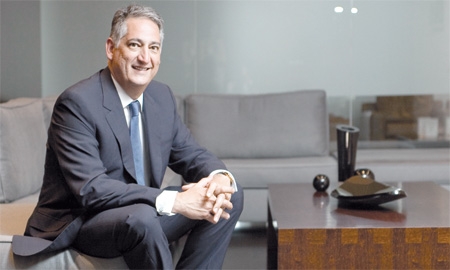
Ivo Lodo, bank president, shares his insight on Brazil’s economy, BVA’s plans for the near future, and Vitoria Asset, the fund management division.
One of the most crucial themes in the Brazilian economy is related to competitiveness and innovation. What are the biggest challenges Brazil faces in this competitive scenario and what measures should be implemented to overcome these challenges?
The main challenge is producing higher value-added exports, which generate greater economic activity in any country. This is especially true for manufactured products, whether exportation services or specialized value-added products, which can prevent dependence on prevailing commodity prices.
However, a second major challenge that involves commodities that are not value-added is export infrastructure. It is not worth making aggressive investments in the Brazilian industry if it aggravates the current bottleneck in our country’s infrastructure, road transportation, and ports. This is a big problem.
Another important need is to establish a structured financial loan system so that Brazilian companies can renew industrial and technological facilities and invest in expansions. Therefore, not only does exporting manufactured products face the challenge of obtaining loans, it also has to overcome the country’s infrastructure problems, especially in transportation. Brazil doesn’t have inter-modal transportation and our port system has huge bottlenecks.
So I believe the greatest challenge in the country is to improve the export process as a whole, not only in terms of product competitiveness but also the outflow of these products for exportation. Furthermore, fiscal policies and tax structures for exporting must be revised.
| ‘THE MAIN CHALLENGE IS PRODUCING HIGHER VALUE-ADDED EXPORTS, WHICH GENERATE GREATER ECONOMIC ACTIVITY IN ANY COUNTRY’ ‘GOING PUBLIC IS INEVITABLE FOR BANKS, BECAUSE THE MORE TRANSPARENCY, MANAGEMENT AND ACCESS TO SUSTAINABLE CAPITAL THE BETTER’ ‘THE BEST STRATEGY IS TO FORM JV’S WITH WELL-ESTABLISHED COMPANIES OR BANKS IN OTHER COUNTRIES THAT CAN MANAGE CROSS-BORDER OPERATIONS’ ‘WE HAVE R$3.1BN IN MANAGED ASSETS AND WE ALSO HAVE SOME INVESTMENT FUNDS AND SHARES. BUT VITORIA’S PRIMARY GOAL IS CREDIT FUNDS’ |
How is the growing availability of credit to Brazilians in less fortunate economic classes contributing to economic growth in Brazil? Is it helping the emergence of a bigger middle class?
Moving from one economic class to another is not as important as socially including those who previously did not have access to the most essential aspects of the market. By this I mean credit in general terms, not only from BNDES (the Brazilian
Development Bank), but a macroeconomic structure to motivate banks, the financial sector, and even foreign capital.
We must encourage and create long-term financing alternatives that enable entrepreneurs to invest in factory expansion, innovation, technology, and development.
The only way Brazil will be able to compete in the global market is if it has the proper research, development, and structure for manufacturing. Increasing the size of an industry instead of investing in research and development does not change the country’s positioning in the global scenario. This kind of policy is what we want the government to encourage, and this is what we expect in the coming years.
In the beginning of 2010 the BVA Bank was not considering going public. Is this still the case, or has the situation changed?
We are preparing to go public. We want to be ready by the end of this year so that next year we can go public and offer the best opportunity in the stock market. The market is slow at the end of the year, so at the moment we are preparing ourselves for the future. Going public is inevitable for banks, because the more transparency, management, and access to sustainable capital the better.
We need to wait for the right opportunity in the stock market to be able to do this. If this opportunity were available today we would lose because we are not prepared. Many banks and businesses, instigated by investment banks eager to charge fees, have been unprepared when they issued an IPO because they did not want to miss the window of opportunity in the stock market.
What ideas do you have about exploring new relationships for the bank in the U.S. market?
We are in the process of communicating with some contacts in the United States, but we have not decided with whom we will establish our partnership. We will probably form a joint venture that will allow us to have access to foreign markets, primarily in the U.S. We see American companies seeking business opportunities in Brazil that fail due to lack of information and access to the local market.
We see Brazilian banks being unsuccessful in their attempts to enter the international market because they are not closely acquainted with the international market.
What can you tell us about your Vitoria Asset unit? How much does it manage?
Vitoria is the fund management division of the BVA Bank that is responsible for generating credit funds. We have R$3.1 billion (US$1.9 billion) managed assets and we also have some investment funds and shares. But Vitoria’s primary goal is credit funds.
This year, we will most likely take steps to ensure that Vitoria grows faster and has a bigger impact. We will possibly divide Vitoria into two sections: equity and debt. These two sections may be kept internally or split into two assets. We are still working on the structure. BVA’s guiding principle is focus and this has certainly contributed to our strong growth.
What message would you like to send USA Today readers about Banco BVA and Brazil?
Believe in Brazil.
0 COMMENTS